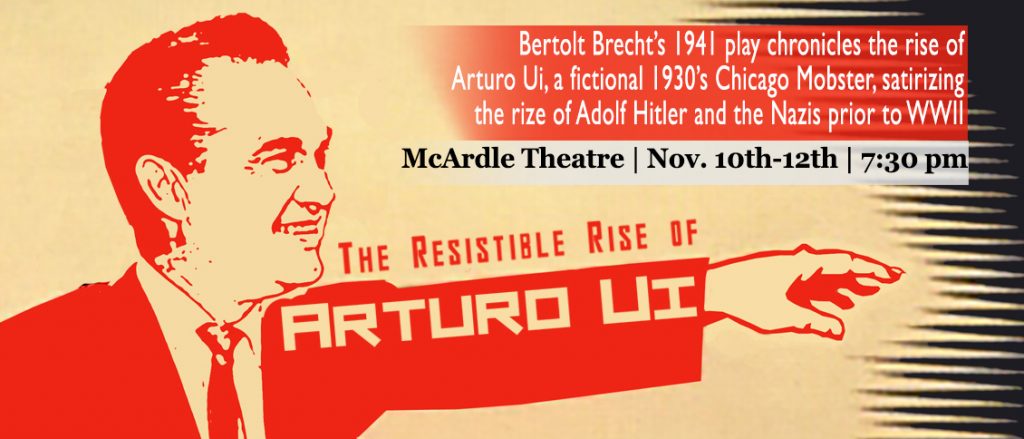From Nov. 10 to 12, the McArdle Theatre will host the play “The Resistible Rise of Arturo Ui.” It was written by Bertolt Brecht in the spring of 1941 as he was waiting for a visa to come to the U.S. He wrote it in three weeks whilst in exile in Helsinki, the capital of Finland. The rise of the Nazis had driven the Marxist Brecht from Germany in 1933, who feared political persecution due to much of the content of his plays and poetry. After fleeing Germany, Brecht moved to Finland to write plays like “The Resistible Rise of Arturo Ui,” which was one of several parodies he composed criticizing the Third Reich. He became famous for his work during his years in exile in the U.S., producing plays such as “Mother Courage and Her Children,” “The Life of Galileo,” “The Good Woman of Setzuan,” and many others. However, Brecht was forced to flee his home once more as he had to face the House of Un-American Activities Committee due to his Marxist beliefs. This time, he went to live in USSR-backed East Germany, living there until his death in 1956 before “The Resistible Rise of Arturo Ui” had ever made its debut.
The play itself is a satirical allegory to the rise to power of Adolf Hitler and the Nazi party in Germany. It follows the fictional gangster and namesake of the play, Arturo Ui, who rises to take control of 1930s Chicago. Ui, like Hitler, is portrayed as charismatic and able to court those under him. The plot revolves around Ui and his rise to control the cauliflower racket in Chicago, doing anything in his power to remove opposition. Brecht’s style of writing contributes to many of the scenes in the play being self-contained, meaning that each scene is independent of the others. This makes the play more of an assortment of scenes focusing on the events that led to and were perpetrated by the Nazis rather than their treatment of others, especially with the annexation of Austria and the burning of the Reichstag. Many of the events and characters in the play have a direct relationship to real-world events and figures, so much so that each of these scenes have the name of corresponding historical event projected in the theater for the sake of the audience.
“The Resistible Rise of Arturo Ui” didn’t have its world premiere until 1958 in Stuttgart, West Germany, two years after the death of its writer. Originally, the play hadn’t been meant for German audiences but rather American ones. Brecht had hopes that eventually it would be shown in Germany, but opposed it until his death due to a fear of any connection the German people may have still had towards the Nazi regime. The play was also performed across Europe in the 1950s and also made it onto Broadway several times in the 1960s, and now we at Michigan Tech can see it this weekend at 7:30 p.m. at the McArdle Theatre.





